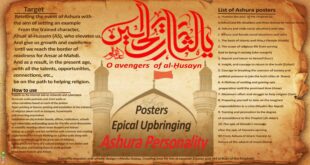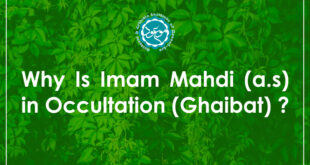Many Muslims carry with them at all times the Prayer Bead String so that they can recite this prayer numerously at any time of the day and night. Especially at times when one has nothing to do such as waiting or sitting around lazily.
So think about it! What better way of filling your spare and idle time than to quietly recite this small Prayer to yourself in the rememberance and in thankfulness of Allah your Creator and Master. And in return Allah will reward His untold Thawaab and A’jar(reward)!
Thus it is good to always recite, in One’s idle times. For it keeps the mind away from straying into troubled terrain. But to keep it travelling on the true and right track of good and steer away from evil with its untold mischievoius wicked thoughts and ideas etc.
Her Sacred Life
The most predominant view in the traditions transmitted by our traditionists is that Fatimah az-Zahra(A.S.) was born in Mecca, on the twentieth of Jumada ‘l-Akhir, in the fifth year of the Prophet’s apostolic career. It is also asserted that when the Holy Prophet(S.A.W.) died, Fatimah(A.S.) was eighteen years and seven months old.
The scholar Abu Said al-Hafiz relates in his book Sharafu’n-Nabiyy that all the children of the Messenger of Allah were born before Islam except Fatimah and Ibrahim, who were born in Islam.
It is reported that the sixth Imam Ja’far as-Sadiq(A.S.) said:
“Fatimah(A.S.) has nine names with Allah. They are: Fatimah, as-Siddiqah (the Righteous), al-Mubarakah (the Blessed), at-Tahirah (the Pure), az-Zakiyyah (the Unblemished), arRadiyah (the one content with Allah’s pleasure), al-Mardiyyah (the one pleasing to Allah), al-Muhaddathah (the one spoken to by angels) and az-Zahirah (the Luminous). In the Musnad (collection of transmitted hadiths) of the eighth Imam Reza(A.S.), it is reported that the Holy Prophet(S.A.W.) declared: “I named my daughter Fatimah because Allah weaned her.
The Holy Prophet(S.A.W.) also called her al-Batul (pure virgin), and said to `A’ishah: “O Humayra’ (a redish white, a well-known epithet of `A’ishah), Fatimah is not like the women of human kind, nor does she suffer the illness you (women) suffer! ” This is explained in another prophetic tradition which asserts that she never menstruated. It is likewise reported by Sunni traditionists on the authority of Anas ibn Malik, who heard Umm Salim, the wife of Abu Talhah al-Ansari, say: “Fatimah never experienced the blood of menstruation or parturition, for she was created from the waters of Paradise.” This is because when the Messenger of Allah was transported to heaven, he entered Paradise, where he ate of its fruits and drank its water.
Proofs Of Her `Ismah (Sinlessness), Some Of The Signs Proving Her Status With Allah, And Traditions Indicating Her Excellence And Exalted Status
One of the most incontrovertible proofs of Fatimah’s sinlessness is Allah’s saying: Surely Allah wishes to keep away all abomination from you, O People of the House, and purify you with a great purification [our. 33 : 33 ] . The argument in favour of this, is that the Muslim community has unanimously agreed that the `People of the House’ (i.e., Ahlu’l-Bayt), intended in this verse are the People of the Household of the Messenger of Allah. Traditions (ahadith) of both the Shi`i and Sunni communities have asserted that this verse particularly refers to ‘Ali(A.S.), Fatimah(A.S.), Hasan(A.S.) and Husayn(A.S.) The Holy Prophet(S.A.W.), moreover, spread over them all one day a Khaybarite mantle and prayed: “O Allah, these are the People of my Household, keep away all abomination from them and purify them with a great purification!” Umm Salamah said: “I too, O Apostle of Allah, am of the People of your House!” He answered: “Your lot shall be good!”
The Divine Will expressed in this verse must by necessity be either an abstract will not implemented by an action, or a will accompanied by an action. The first option is untenable because it implies no particular applicability to the People of the Prophet’s House; such a will is shared by all obligated (mukallafin) human beings. Nor is abstract will by itself cause for praise. The entire community has concurred on the view that this verse proclaims the excellence of the People of the Prophet’s House over all others, and that the verse refers to them alone. Thus the second option (that the Divine Will referred to in the verse is a will accompanied by action) is true, and in it is clear proof of the sinlessness of those who were intended in the verse. It implies further that it is impossible for them to commit any evil action. Moreover, any others whom we have not named here are no doubt not held by general consensus as possessing `ismah (protection from error). Thus since the verse necessarily implies sinlessness it must apply to them (the People of the Prophet’s House), because it pertains to no other individuals.
The Holy Prophet of Islam(S.A.W.) said:”Fatimah(A.S.) is part of me”
Another proof of Fatimah’s sinlessness is the Holy Prophet’s saying concerning her: “Fatimah(A.S.) is part of me. Whatever causes her hurt, hurts me.” He also said: “Whoever hurts Fatimah(A.S.), hurts me, and whoever hurts me, hurts Allah, exalted be His Majesty! ” The Holy Prophet(S.A.W.) said further: “Allah becomes wrathful for Fatimah’s anger, and is pleased at her pleasure.”.
Among the signs indicating Fatimah’s exalted status with Allah is an incident related by both Shi’i and Sunni traditionists on the authority of Maymunah (the Holy Prophet’s wife), who reported that Fatimah(A.S.) was found asleep one day, the handmill beside her turning of its own accord. She informed the Apostle of Allah of this, and he said: “Allah knew the weak condition of His handmaid; He thus inspired the handmill to turn by itself, and so it did.” Among the reports asserting her excellence and high distinction over all other women is the tradition reported on the authority of `A’ishah who said: “I never saw a man more beloved of the Apostle of Allah than `Ali(A.S.), or a woman more dear to him than Fatimah(A.S.).”
Sunni traditionists also reported on the authority of the Commander of the Faithful Imam Ali(A.S.)who said: “I asked the Messenger of Allah, `Who is more beloved to you, Fatimah(A.S.) or I?’ He answered, `Fatimah(A.S.) is more beloved to me, and you are dearer to me than she is.’ ” These traditionists also reported from Anas ibn Malik that: “Fatimah(A.S.) is the most excellent of all the women of the world.” In another tradition it is reported that the Holy Prophet(S.A.W.) said: “The most excellent among the women of the world are: Maryam daughter of `Imran (that is, the virgin Mary), Asiyah daughter of Muzahim (wife of Pharaoh), Khadijah daughter of Khuwaylid and Fatimah(A.S.) daughter of Muhammad(S.A.W.)” It is also related on the authority of Ibn `Abbas who said: “The most excellent of the women of Paradise are: Khadijah daughter of Khuwaylid, Fatimah(A.S.) daughter of Muhammad, Maryam daughter of `Imran and Asiyah daughter of Muzahim.” Traditionists report that `Abdu ‘r-Rahman ibn `Awf said: “I heard the Apostle of Allah say, `I am a tree, Fatimah(A.S.) is its trunk and ‘Ali(A.S.) is its pollen. Hasan(A.S.) and Husayn(A.S.) are its fruits, and our followers (Shi’ah) are its leaves. The roots of the tree are in the Garden of Eden, and its trunk, fruits and leaves are in Paradise.’ “
Traditionists further report on the authority of `A’ishah that: “Whenever Fatimah(A.S.) came to the Messenger of Allah, he would rise from his seat, kiss her on the forehead, and make her sit with him.” Traditionists have also reported on the authority of ‘Ali ibn Ibrahim al-Qummi in his commentary of the Holy Qur’an, as related on the authority of the sixth Imam as-Sadiq, Ja’far ibn Muhammad(A.S.), who said: “We were told that our forefathers said that the Messenger of Allah often indulged in kissing the mouth of Fatimah(A.S.) the mistress of the women of the world, so that `A’ishah finally protested saying, `O Messenger of Allah, I see you indulge so often in kissing the mouth of Fatimah(A.S.) and placing your tongue in her mouth.’ He answered, `Yes, O `A’ishah, when I was taken up to heaven, Gabriel took me into Paradise and brought me near the tree of Tuba (beatitude). He gave me an apple of its fruits which I ate. Thus when I returned to earth, Khadijah, conceived Fatimah(A.S.). Whenever, therefore, I yearn for Paradise, I kiss her and place my tongue in her mouth, for I find in her the fragrance of Paradise. I also sense in her the fragrance of the tree of Tuba. Fatimah(A.S.) is thus a celestial human being.’ “
The traditions which our Companions (that is, Shi’i hadith transmitters), may Allah be pleased with them, have reported in proof of Fatimah’s special place – her honoured status and distinction over all the women of humankind – are beyond number. We shall, therefore, limit ourselves to the reports which we have already mentioned.
 Mouood Mouood English Edition
Mouood Mouood English Edition




